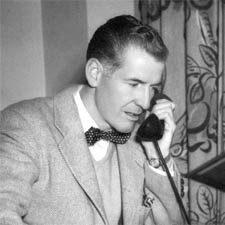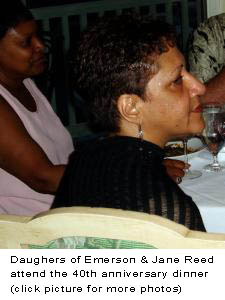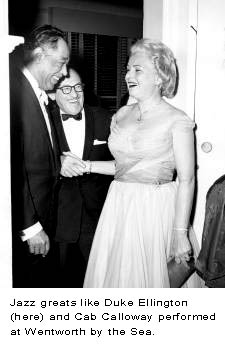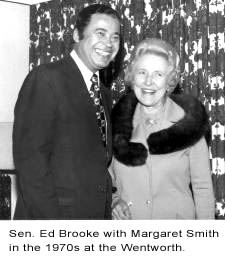| Guess Who Came to Dinner |

Black History of the Seacoast
Three years before Sidney Poitier confronted Spencer Tracey at the dinner table, two Seacoast men faced off. James Smith denied Emerson Reed his civil right to dine in a public restaurant. Reed fought back – and won.
It was Jim Smith's worst nightmare. Last week dozens of African Americans crowded into the dining room at Wentworth by the Sea in New Castle. They came to celebrate the anniversary of the integration of the once-exclusive seaside resort.
 Just forty years earlier, on July 4, 1964, Wentworth owner James Barker Smith had refused to seat two black guests, Emerson and Jane Reed, when they arrived for dinner and joined a white couple, Jean and Hugh Potter of Durham. With the room festooned in flags celebrating American independence, Smith insisted that the two men join him in his office. Jean Porter remained in the dining room to hold the table and Jane Reed was asked to stay in the hotel lobby.
Just forty years earlier, on July 4, 1964, Wentworth owner James Barker Smith had refused to seat two black guests, Emerson and Jane Reed, when they arrived for dinner and joined a white couple, Jean and Hugh Potter of Durham. With the room festooned in flags celebrating American independence, Smith insisted that the two men join him in his office. Jean Porter remained in the dining room to hold the table and Jane Reed was asked to stay in the hotel lobby.
Hugh Potter, a UNH professor, explained to Smith that they had made reservations for four and paid for their dinners in advance.
"You didn't tell me the other couple was black!" Smith exclaimed.
"No," Potter replied. "Nor did I tell you that I'm Scotch-Irish."
Smith was not amused, Jean Potter explained recently in a hand-written letter to this writer.
"He asked why my husband didn't go back to Africa with all the others," Potter recalls.
But the group insisted on being seated together in the dining room. Smith offered to let the Reeds eat in the kitchen. After a two-hour argument over the ethics and illegality of segregation, and only after Potter produced the receipt for the four meals, the Reeds were allowed to join them -- and the Wentworth was officially integrated.
In fact, the operation had been carefully designed by local members of the NAACP to test the enforcement of new Civil Rights legislation enacted earlier that year under President Lyndon Johnson. An "exclusive" hotel from its earliest days, the Wentworth was on the list of businesses known to openly discriminate against blacks in the Portsmouth region. Some local barbers refused to cut the hair of African Americans, claiming that they did not have the proper tools. Some hotels were perpetually filled to capacity whenever black guests appeared. Even government officials at Pease Air Force Base knowingly offered one list of off-base housing to blacks and a separate list to whites. Racism descended from an age of slavery was evident, though expressed with more subtlety, in New England as it had always been in the south.

By contrast, the event in 1964 turned into a shouting match. According to the book Black Portsmouth, released this week by Cunningham and co-author Mark Sammons, Jim Smith insisted that he would seat a black in his dining room only over his dead body. He had worked with blacks in the military, Reed recalled him saying, and he did not like them.
Despite his reputation as an extremely affable host of the hotel for 34 years, Smith had purchased the Wentworth in 1946 from then-owner Harry Beckwith as an exclusive hotel. It did not, at the time, serve or employ people of color. It also did not serve Jews, Catholics, Greeks or other minorities. Records on file in the Friends of the Wentworth collection at the Portsmouth Athenaeum show that Beckwith routinely vetted unfamiliar guests through an agency that checked their ethnic and religious backgrounds. In 1946, when the Smiths were shopping for a hotel in New England, Boston real estate agent Arthur Langdon informed the couple that the Wentworth, one of the last exclusive hotels on the Atlantic coast, had just gone on the market. The purchased it for $200,000.
For a time the Smiths also owned the Rockingham Hotel in Portsmouth and followed the same policies there. In 1948 local filmmaker Louis de Rochemont produced one of the first major motion pictures to deal with the issue of race. De Rochemont shot part of the film "Lost Boundaries" in the Seacoast using black cast members and set up his operation at the Rockingham. When Jim Smith refused to let the black cast members eat in that dining room, de Rochemont threatened to spend his money at another hotel, and Smith relented.

Ironically, of all the couples involved in the Wentworth civil rights "sting", only the Reeds were Portsmouth natives. Jim and his wife Margaret were originally from Colorado and had previously operated a hotel in Texas. The Potters had recently moved to New Castle from the Midwest. Emerson Reed, by contrast, had attended Portsmouth High School. Like Jim Smith, Reed had served in the military in World War II. He later became a foreman at the Portsmouth Naval Shipyard. One of his ancestors was among a little known group of black patriots who had fought in the American Revolution.
In a small way it could be said that the Reeds, with the Potters, fought in another American revolution, one that continues to this day. In 1964, Emerson Reed admits in the book Black Portsmouth, that he eventually got angry when Jim Smith refused them the right to enter the hotel dining room. Forty years ago, remembering how his own father had been discriminated against while living in Portsmouth, Reed offered back a threat of his own.
"I'll bring so many Blacks back here," he remembers telling the hotel owner as tempers flared, "that you'll wish you had of let us in."
Last week, for perhaps the first time in its 130-year history, Blacks outnumbered whites under the ancient dome at Wentworth by the Sea in rural New Hampshire. Every seat was taken. It was an historic and poignant moment. It was, ironically, a profitable moment too, for a very different type of management in a very different America.
J. Dennis Robinson is author of the book Wentworth by the Sea: The Life & Times of a Grand Hotel. Black and white photos courtesy of the Portsmouth Athenaeum.
SEE ALSO: Seacoast Black History
SEE ALSO: Wentworth by the Sea
